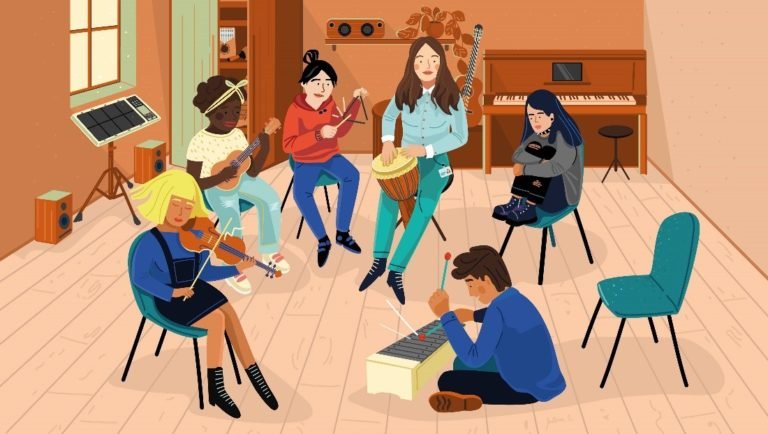
Music Therapy: A Harmonious Path to Healing

music therapy
Music therapy, a field that harnesses the power of music to promote healing and well-being, has gained increasing recognition as an effective therapeutic tool. This form of therapy involves the use of music and its elements—such as melody, rhythm, and harmony—in a structured way to address physical, emotional, cognitive, and social needs. It is employed across various settings, including hospitals, schools, and private practices, and caters to diverse populations, from children with developmental disabilities to elderly individuals dealing with dementia.
One of the fundamental aspects of music therapy is its ability to create a safe and non-threatening environment where individuals can express themselves and explore their emotions. Through singing, playing instruments, and listening to music, clients can connect with their feelings and experiences in ways that may be difficult to articulate through words alone. This process not only fosters emotional expression but also helps in building self-esteem and confidence.
Music therapy also holds significant benefits for cognitive development and rehabilitation. For individuals recovering from strokes or brain injuries, engaging in musical activities can enhance cognitive functions such as memory, attention, and problem-solving skills. Rhythm-based interventions, in particular, have been shown to improve motor coordination and help with speech and language recovery. This makes music therapy a valuable adjunct to traditional rehabilitation programs.
In addition to its cognitive and emotional benefits, music therapy is also effective in managing physical symptoms. For patients experiencing pain, stress, or anxiety, music therapy can provide a calming effect and promote relaxation. The soothing properties of music can help reduce the perception of pain and improve overall quality of life. For instance, in palliative care settings, music therapy has been used to alleviate discomfort and offer solace to patients facing terminal illnesses.
Furthermore, music therapy fosters social connections and improves interpersonal relationships. Group music therapy sessions provide opportunities for social interaction and collaboration, which can be particularly beneficial for individuals who may feel isolated or withdrawn. By participating in group musical activities, clients can develop social skills, enhance their sense of belonging, and build supportive relationships with others.
Overall, music therapy stands out as a versatile and impactful approach to enhancing well-being. Its integration of music into therapeutic practices offers a holistic pathway to healing that addresses various aspects of human health. Whether used to aid in emotional expression, cognitive development, pain management, or social interaction, music therapy provides a harmonious and enriching experience that can profoundly improve individuals’ lives.
How does music therapy differ from traditional music education or recreational music activities?
Music therapy differs significantly from traditional music education or recreational music activities in its purpose and approach. While traditional music education focuses on teaching musical skills, theory, and performance to enhance technical proficiency and artistic expression, music therapy uses music as a therapeutic tool to address specific emotional, cognitive, and physical needs. In a music therapy session, the primary goal is not to develop musical talent but to use music as a medium for healing and personal growth. Therapists employ structured interventions tailored to each individual’s needs, such as improvisation, songwriting, or guided listening, to achieve therapeutic outcomes. Unlike recreational music activities, which are often aimed at enjoyment or social engagement, music therapy involves a therapeutic relationship and a planned, goal-oriented approach to support mental health, improve quality of life, and address various conditions. Thus, while both music education and recreational activities celebrate music, music therapy is distinct in its focus on utilising music as a purposeful tool for therapeutic change.
What emerging trends or research findings are shaping the future of music therapy?
Emerging trends and research findings are significantly shaping the future of music therapy by expanding its applications and enhancing its efficacy. One notable trend is the integration of technology, such as digital music tools and virtual reality, which is allowing for more innovative and accessible therapeutic interventions. Research into neuroplasticity and brain function has highlighted how music therapy can promote neural regeneration and cognitive recovery, particularly in individuals with neurological conditions like stroke or dementia. Additionally, there is a growing focus on personalised and data-driven approaches, where therapists use biofeedback and physiological data to tailor interventions more precisely to individual needs. The exploration of cross-disciplinary approaches, combining music therapy with other modalities such as art or dance therapy, is also gaining traction, offering holistic treatment options. Furthermore, increased emphasis on evidence-based practices and large-scale studies is helping to validate the effectiveness of music therapy across diverse populations and conditions, leading to greater acceptance and integration within mainstream healthcare and educational systems. These advancements are broadening the scope and impact of music therapy, making it a more versatile and scientifically grounded therapeutic tool.
Are there specific music genres or types of music that are particularly effective for certain therapeutic goals?
Yes, certain music genres and types of music can be particularly effective for specific therapeutic goals, depending on the individual’s needs and the therapeutic context. For example, classical music, with its structured and harmonious qualities, is often used to promote relaxation and reduce anxiety, as its soothing melodies and rhythms can lower stress levels and foster a sense of calm. Conversely, upbeat genres like jazz or pop can be beneficial for boosting mood and increasing energy levels, making them suitable for individuals dealing with depression or low motivation. Rhythmic music, such as drumming or rhythmic patterns, can be especially effective for improving motor coordination and cognitive function, particularly in patients recovering from stroke or traumatic brain injuries. For individuals with trauma or PTSD, music with grounding or familiar elements, such as nature sounds or lullabies, may provide comfort and a sense of security. The effectiveness of a particular genre or type of music often depends on personal preferences and cultural context, highlighting the importance of tailoring music therapy interventions to each individual’s unique background and therapeutic goals.